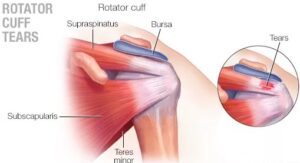Rotator Cuff Injury
Overuse Injury
Overuse injuries are a leading cause of damage, where the rotator cuff gradually gets overworked.
Overuse injuries consist of tendinopathy, chronic partial thickness tears, and chronic fullness tears. Tendinopathy are repetitive microtraumas (i.e. wear and tear) with the tendon remaining intact. Chronic partial thickness tears (small – moderate) are incomplete tendon tears (portion of tendon still intact), while chronic full-thickness tears (large) are complete tendon tears.
Risk factors for rotator cuff overuse injuries stem from your chosen sport, occupation, strength, and general health. For example, repetitive lifting, throwing, overhead movement, prolonged postures, older age, increased weight, diabetes, muscle imbalance, and muscle tightness.

Traumatic injury
The other cause of rotator cuff injuries is traumatic injury. Whether it is a fall onto the arm, a forceful movement, or heavy/awkward lifting, they can create varying degrees of rotator cuff tearing. Acute injuries have various severity from a portion of the tendon still intact (partial thickness tear) to complete tendon tears (full thickness tears).
What are the signs & symptoms of rotator cuff pain?
Rotator cuff pain can present differently from person to person, depending on the location, type & severity of injury. Often pain is either at the front or side of the shoulder, with extended pain down the upper arm common. Movement is usually limited above shoulder height and with rotating the arm outwards. Rotator cuff pain may impact your ability to sleep on your injured shoulder, wash your hair, put your wallet in your back pocket, and lift (especially above your head).
Treatment Options
1. Physiotherapy
Physiotherapy is the first-line treatment option for rotator cuff-related shoulder pain. Physiotherapy is recommended in cases of tendinopathy, partial thickness tears of less than 50%, and chronic full-thickness tears in elderly or inactive patients. Extensive research and clinical trials (Sambandam et al., 2015, 902-918) have demonstrated that the results of surgery and conservative treatment produce similar results in pain and function. Often rotator cuff injuries will resolve within 6-12 weeks of regular physiotherapy.
2. Surgeries
Operative treatments are suggested for full-thickness tears in active or sporting patients. In rare scenarios, surgeries would be considered where minimal improvements in pain, movement, and/or function are made with more than 6-months of physiotherapy.



